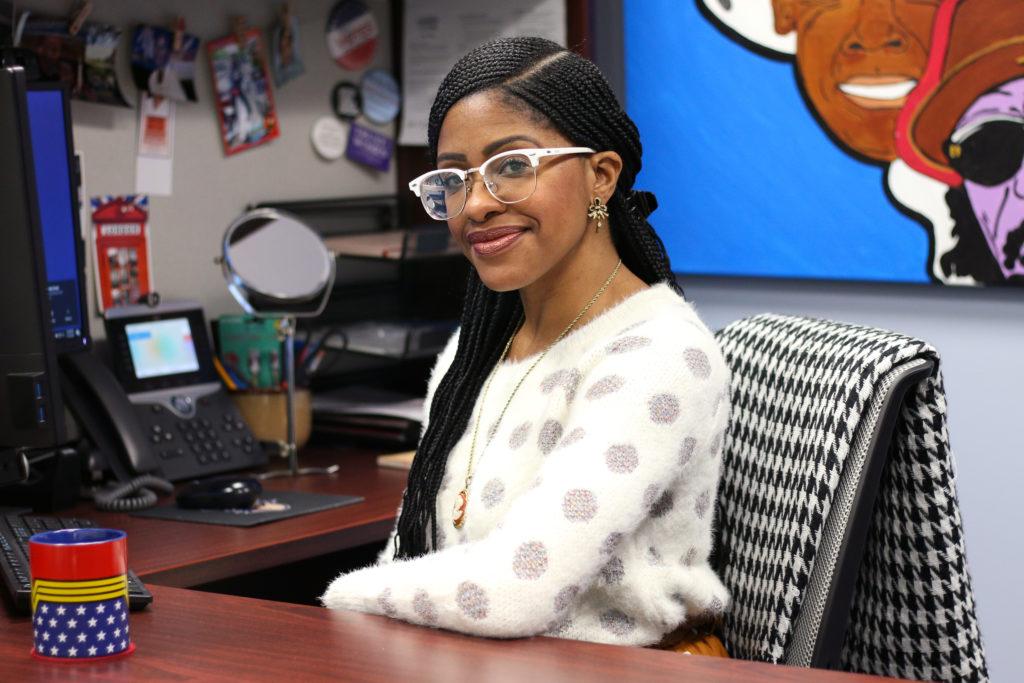Maranda Ward, a visiting assistant professor of clinical research and leadership, said she can count about 20 different places to eat within a half-mile of her office building in the Watergate complex.
But across the Anacostia River in Ward 7, she said there are only three sit-down restaurants. She said food deserts and limited access to health care in Wards 7 and 8 contribute to greater health disparities in the District – an issue she wants to address in her new role as a member of the D.C. Department of Health Commission on Health Equity.
“These were the types of discrepancies that were my day-in and day-out encounters,” Ward said.
Ward was appointed to the health equity commission in December and officially assumed her spot earlier this month. She said she will use her new position to help students and colleagues understand that access to nutritious food and health care drastically changes for residents who live outside of the “Foggy Bottom bubble.”
“I wanted them to know about what I call the ‘tale of two cities,’” she said.
Ward began teaching at GW about seven years ago and graduated from the Graduate School of Education and Human Development in May 2017 with a doctorate degree in curriculum and instruction. She currently teaches two sections of a class about psychosocial aspects of health and illness and one section of a class on global women’s health. Ward has also taught classes about disease prevention and applied health equity.
As a commissioner, Ward said she is most excited to discuss the role of a new hospital that will open in Ward 8 in 2023. GW Hospital agreed to run the new facility over the summer but has faced backlash as local officials attempt to speed up construction.
Ward said the commission will offer recommendations to the D.C. Council about the operations of the new hospital and give advice about addressing “historical disparities” in access to nearby medical services between residents of Wards 7 and 8 and residents of other parts of D.C.
“Let’s bring the services to them,” she said. “I realize that takes a lot of money and human capital, but the city has it. It’s all about relocating it.”
The Commission on Health Equity launched in 2015 to address the “root causes” of health disparities in the District by evaluating the discrepancies between each election ward in the city. Ward will represent Ward 8, where she currently resides.
Ward previously served as an Advisory Neighborhood Commissioner in Ward 7 between 2017 and 2018. She is also the training director for the Governor’s Academy of Health Sciences, a center launched last semester by the School of Medicine and Health Sciences to educate high schoolers on medical topics.
Ward said research reports and news stories often paint Wards 7 and 8 as filled with “despair” and “risk” – cursory accounts that lack depth and understanding. She said that in her new role, she hopes to change the “deficit” narrative and discourage people from having a “savior complex” or approaching community issues with a charity model.
Ward said she also has her own podcast called #EquityMatters, which launched in 2017 and discusses health equity and inclusion.
Lionel Howard, an associate professor of educational research, said he met Ward in 2014 when she received the Risk and Resilience Fellowship that he commissioned for doctoral students. He said he eventually became a member of her dissertation examination committee.
Howard said that as someone who identifies herself as a “community educator, curriculum developer and youth builder,” Ward is able to draw from her own experiences in the education and health fields to teach others.
“Having that real, on-the-ground experience coupled with theoretical training is invaluable,” Howard said.
Howard said that unlike some researchers or practitioners who might address a situation or problem with the idea that they know what is best for a community, Ward creates a space for community members to have a voice in how to address problems.
“She really listens to the people that she’s working with,” he said.
Grayson Wormser, a senior studying international affairs, said he met Ward working with the youth-mentoring student organization Lemonade Day. He said her “passion” for young people was evident, and she creates engaging activities for students to help them understand health equity.
“Doc is truly a person that gives more than she takes while always putting a smile on people’s faces,” he said in an email.




